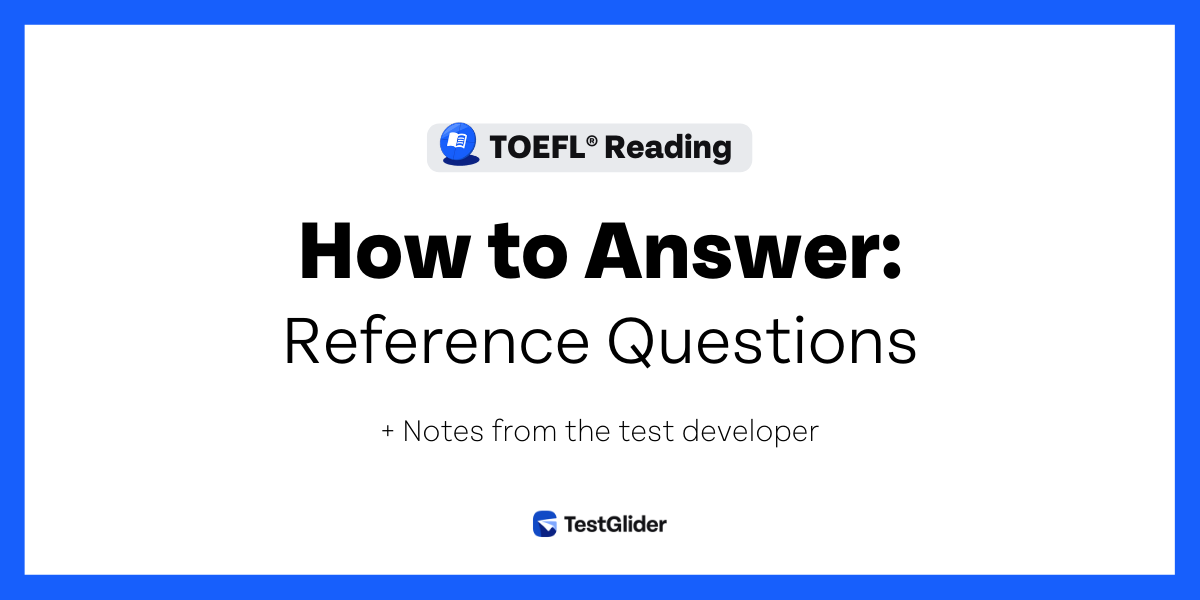
Information about Reference Questions
Reference questions are visually similar to Vocabulary questions because they ask you to identify the meaning of a single word or phrase that is highlighted in the passage. However, that word will always be a pronoun or words like this, that, who, or which. Instead of defining the word, the task is to find the word in the passage that the highlighted word refers to. If it is a pronoun, then the correct answer will be the word that the pronoun is replacing.
All four of the answer choices will be present in the text near the selected word. They are usually before it, but some may come after. These kinds of questions are less common than they used to be, and many passages do not include them. They are always written as follows:
The word “X” in the passage refers to …
TOEFL Reading Reference Question Example
Here is an excerpt from a passage and its Reference question:
> “All environmental factors cause the body physical stress, but they also cause mental stress, which can be equally influential if not more so. Scientific studies with mice have shown that mental stress can cause hormone imbalances that result in epigenetic changes. In one experiment, mice were restrained, which raised their stress levels and triggered higher levels of N6-methyladenine (6mA) in their brains, which resulted in epigenetic changes. In another experiment, mice were given water with corticosterone, the mouse equivalent of the human stress hormone cortisol, for four weeks. This put them into a heightened state of stress and caused them to have fewer methyl groups on gene Fkbp5, which increased protein production. The different epigenetic markers lasted for weeks after they stopped receiving corticosterone, which suggests long-term change.”
1. The word “This” in the passage refers to
(A) experiment
(B) corticosterone
(C) cortisol
(D) stress
Explanation :
The correct answer is (B) corticosterone. The sentence is describing the effect that the artificially administered hormone had on mice. The other answer choices all appear in the paragraph, but they are not what directly affected the mice.
Notes from the Test Developer
When writing Reference questions, all of the answer choices will be nouns that appeared near the pronoun in the same paragraph. As mentioned above, this type of question is used less often than it used to be. Years ago, most passages had one reference question, but recently they are much rarer.
Sometimes a test will not contain any Reference questions. I can only speculate as to why ETS has lost interest in this type of question, but there are two reasons why I personally do not prefer them. They are actually kind of difficult to write, and they are usually pretty simple to solve. When I do write them, I try to choose a pronoun that has many easily distinguishable nouns around it.
Advice to Test Takers
To successfully answer Reference questions on the TOEFL Reading section, consider these strategic approaches:
-
Identify the Context
- Read the complete sentence containing the reference word
- Look at the sentences immediately before and after
- Pay attention to the logical flow of ideas
-
Apply the Substitution Method
- Try replacing the reference word with each answer choice
- Check if the sentence maintains its logical meaning
- Verify if the grammar remains correct after substitution
-
Consider Grammatical Agreement
- Ensure the reference word and its antecedent agree in number (singular/plural)
- Check for gender agreement where applicable
- Verify that the grammatical function matches
-
Use Time Management Wisely
- Since reference questions typically appear near their answers in the text, limit your search to the immediate area
- If you’re spending too much time deciding between options, mark your best guess and move on
- Remember that there’s no penalty for incorrect answers on the TOEFL
-
Watch for Common Patterns
- Reference words often refer to the main subject of the previous sentence
- Be careful with multiple similar nouns in the same paragraph
- Pay attention to whether the reference word is pointing to a concept, an action, or an object
These strategies should help you approach Reference questions systematically and efficiently during the exam.
🎯 Ready to Master TOEFL Reading?
Take TestGlider’s FREE TOEFL Practice Test and assess your current reading level. Join thousands of test-takers who’ve improved their scores through our comprehensive practice materials.
